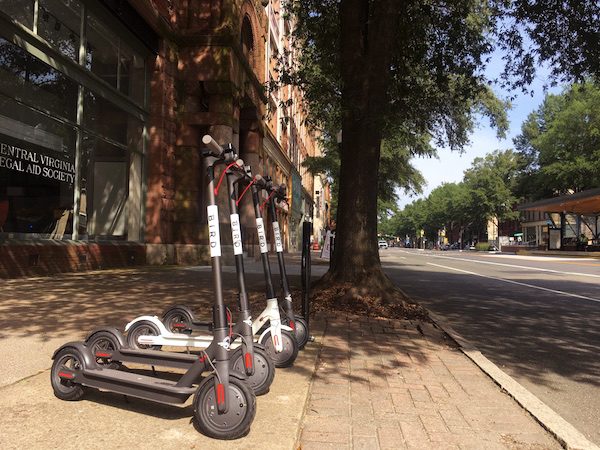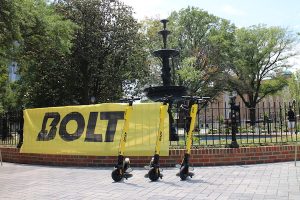
Bird has decided to remove its scooters from Richmond due to the coronavirus pandemic. (BizSense file photo)
As one electric scooter rental company hits pause on its Richmond operations, another operator continues service in the city as the coronavirus pandemic rages.
Bird, the West Coast-based on-demand scooter startup, has decided to remove its fleet of scooters from Richmond streets. It’s unclear when its scooters may return.
The other scooter company with a local presence, Bolt Mobility, has decided its fleet will stay put for now.
The industry is grappling with whether, and if so how, to continue operations during the coronavirus crisis.
“Our decision to temporarily pause our service in Richmond is very fluid as the response to and recommendations regarding COVID-19 evolve and is in line with voluntary, as well as mandatory measures set by local governments for businesses,” a Bird spokeswoman said in an email Monday.
The decision to pause service in cities is being made on a case-by-case basis with input from community leaders, Travis VanderZanden, Bird founder and CEO, said in a March 12 statement on the company’s website.
Bolt sees things differently, and is positioning itself as a more sanitary alternative to public transportation.
“For the time being, we have determined with the Department of Public Works that our scooters can serve a vital need in the city for safe, sustainable, and individualized form of public transport at a time when collective travel poses real risks to the public health,” Will Nicholas, Bolt executive vice president of operations, said in an email Tuesday.
Nicholas said workers in essential industries such as health and food still need transportation, and the scooters provide them a way to get to their jobs as other options either shut down or become undesirable.
He said the company’s local teams are monitoring the cleanliness of the scooter fleet, wearing protective gear while deep-cleaning scooters throughout the day.
The company has several hundred scooters in the city, according to its app. They’re clustered in areas such as Scott’s Addition, the Museum District, VCU and Shockoe Bottom.
Nicholas also pitched the scooters as a way for small businesses and local organizations to complete deliveries during the outbreak, and said the company was willing to work with businesses interested in a partnership.
The disruption of Bird’s local operations caused by coronavirus is the latest turn in the company’s on-again, off-again time in Richmond. It made its unannounced entrance to the Richmond market in 2018, dropping hundreds of scooters on city streets.
The city then promptly impounded Bird scooters left on sidewalks because they violated right-of-way laws. That prompted conversations between city and company officials that resulted in a licensing program. Bird relaunched locally in October, but not before Bolt was first to legally set up shop here.

Bird has decided to remove its scooters from Richmond due to the coronavirus pandemic. (BizSense file photo)
As one electric scooter rental company hits pause on its Richmond operations, another operator continues service in the city as the coronavirus pandemic rages.
Bird, the West Coast-based on-demand scooter startup, has decided to remove its fleet of scooters from Richmond streets. It’s unclear when its scooters may return.
The other scooter company with a local presence, Bolt Mobility, has decided its fleet will stay put for now.
The industry is grappling with whether, and if so how, to continue operations during the coronavirus crisis.
“Our decision to temporarily pause our service in Richmond is very fluid as the response to and recommendations regarding COVID-19 evolve and is in line with voluntary, as well as mandatory measures set by local governments for businesses,” a Bird spokeswoman said in an email Monday.
The decision to pause service in cities is being made on a case-by-case basis with input from community leaders, Travis VanderZanden, Bird founder and CEO, said in a March 12 statement on the company’s website.
Bolt sees things differently, and is positioning itself as a more sanitary alternative to public transportation.
“For the time being, we have determined with the Department of Public Works that our scooters can serve a vital need in the city for safe, sustainable, and individualized form of public transport at a time when collective travel poses real risks to the public health,” Will Nicholas, Bolt executive vice president of operations, said in an email Tuesday.
Nicholas said workers in essential industries such as health and food still need transportation, and the scooters provide them a way to get to their jobs as other options either shut down or become undesirable.
He said the company’s local teams are monitoring the cleanliness of the scooter fleet, wearing protective gear while deep-cleaning scooters throughout the day.
The company has several hundred scooters in the city, according to its app. They’re clustered in areas such as Scott’s Addition, the Museum District, VCU and Shockoe Bottom.
Nicholas also pitched the scooters as a way for small businesses and local organizations to complete deliveries during the outbreak, and said the company was willing to work with businesses interested in a partnership.
The disruption of Bird’s local operations caused by coronavirus is the latest turn in the company’s on-again, off-again time in Richmond. It made its unannounced entrance to the Richmond market in 2018, dropping hundreds of scooters on city streets.
The city then promptly impounded Bird scooters left on sidewalks because they violated right-of-way laws. That prompted conversations between city and company officials that resulted in a licensing program. Bird relaunched locally in October, but not before Bolt was first to legally set up shop here.




This article fails to put this in national or regional context. What are these companies doing in other cities, and how does that compare to Richmond? The first line is classic: “as the pandemic rages…” This reminds me of the verbiage used to describe mass shootings as “massacres” instead of mass shootings. It leaves a Richmond resident to wonder…”are we really in that bad of shape that scooter companies are pulling out?” No, this isn’t unique to Richmond, so if you’re going to use words like “panedemic rages” also consider including statistics that readers can use to be informed.
Pandemic Rages…
According to a previous BizSense article, Bolt is required, per its contract, to keep 175 of its 500 scooters in low income neighborhoods. I would be very surprised if there are any scooters at all in low income neighborhoods.
Never saw a Bolt but I did see a couple of Bird ones in Creighton Court off Nine Mile Road when trying to avoid a delay on 64. Interesting part is that with GPS they can tell where they are located but remember Randolph neighborhood, Carver too, are considered LMI neighborhoods. Byrd Park was until about 2 years ago.